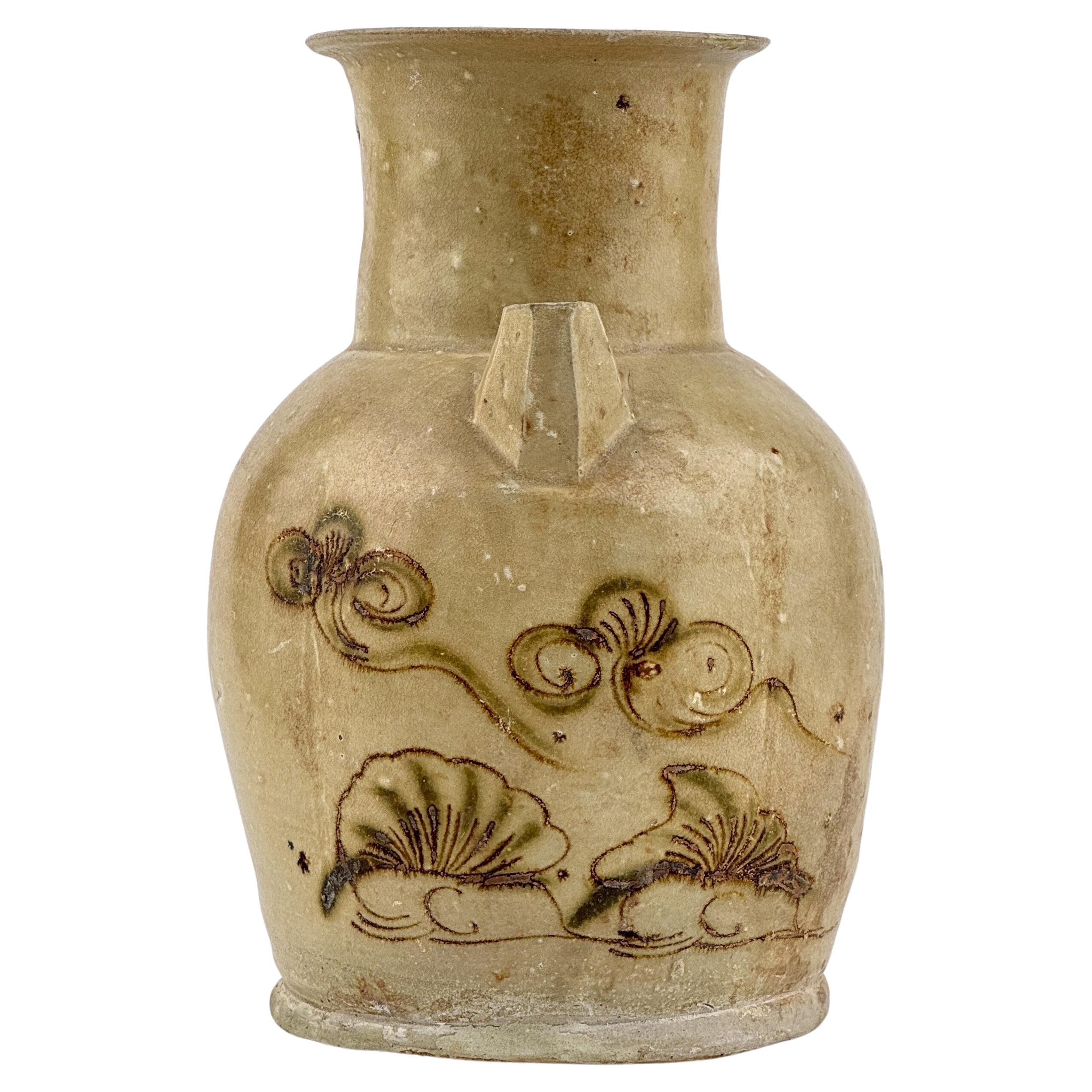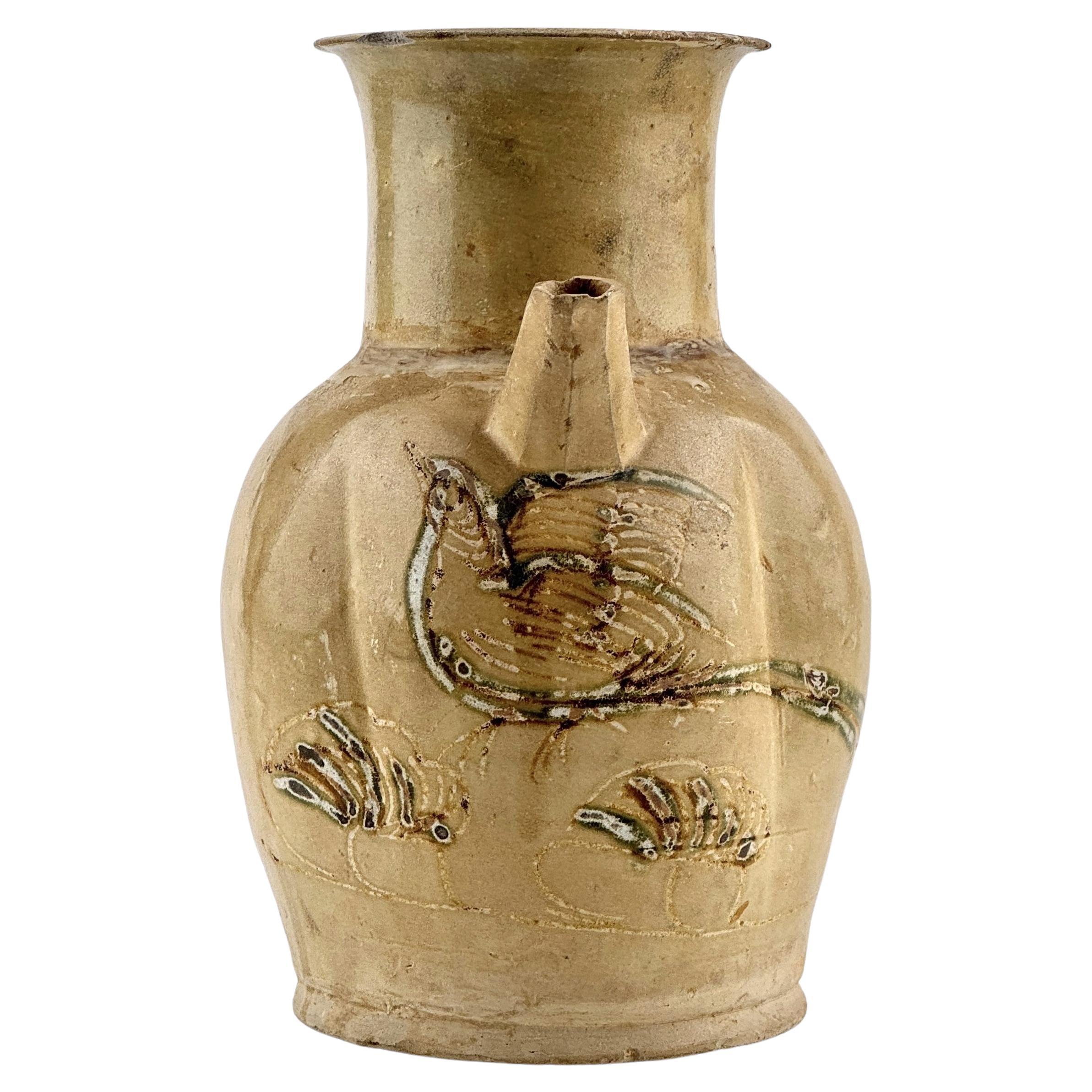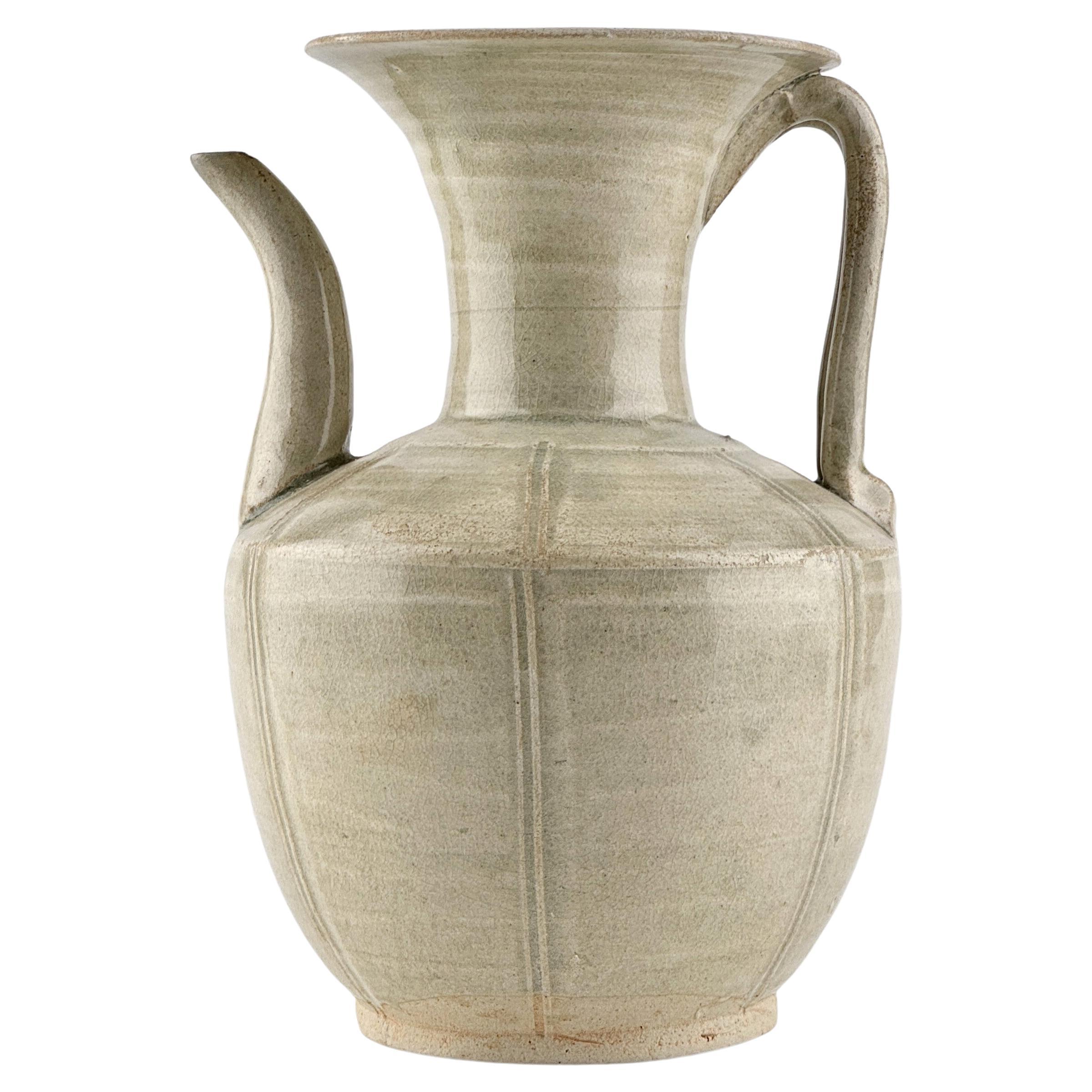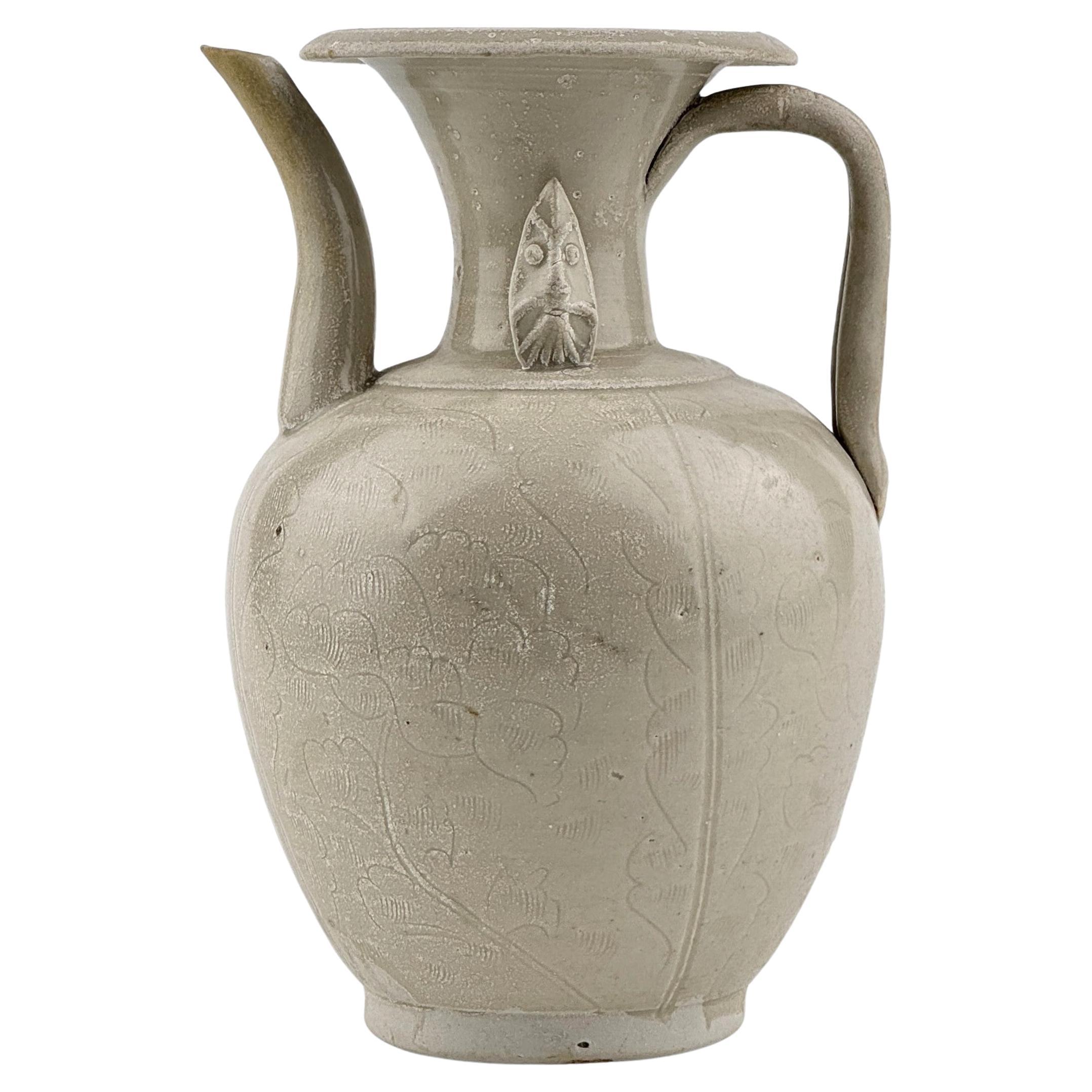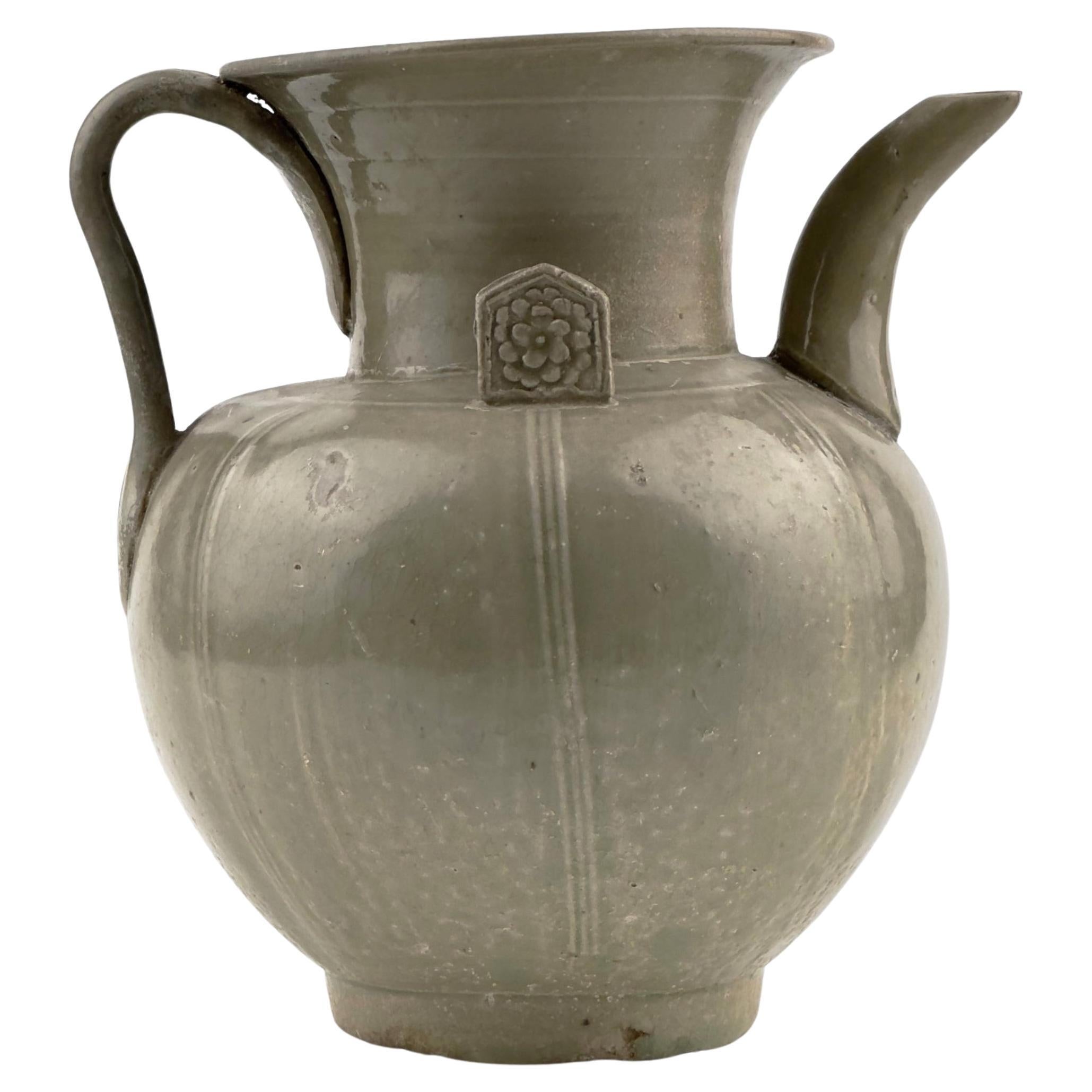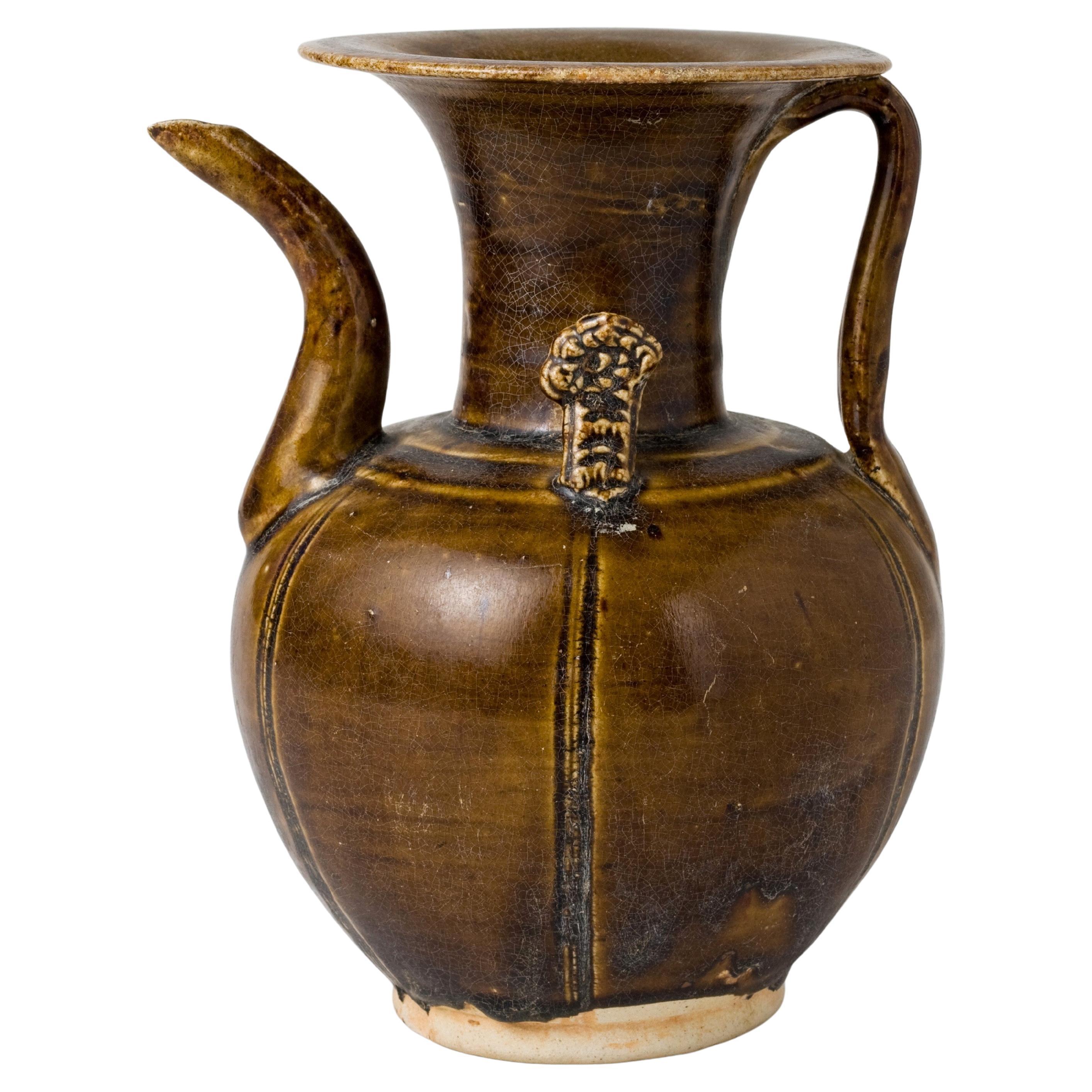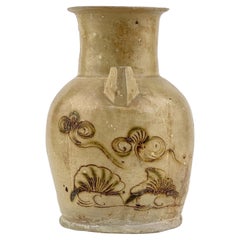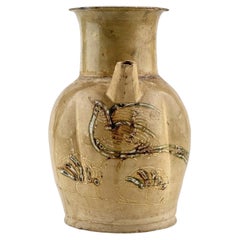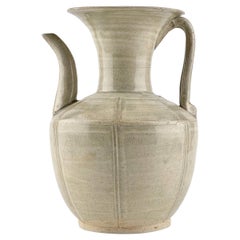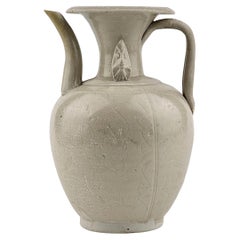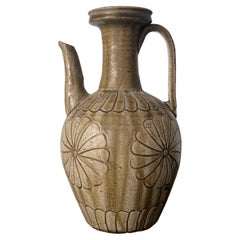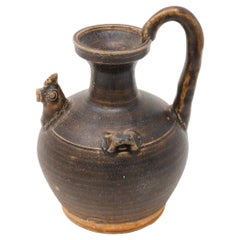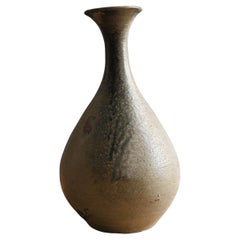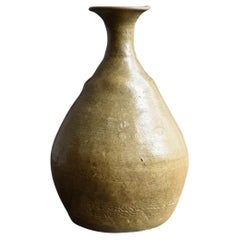Items Similar to Changsha Ewer, Tang Dynasty
Want more images or videos?
Request additional images or videos from the seller
1 of 13
Changsha Ewer, Tang Dynasty
$1,516
$3,79060% Off
£1,150.31
£2,875.7660% Off
€1,315.27
€3,288.1860% Off
CA$2,117.44
CA$5,293.6060% Off
A$2,354.31
A$5,885.7760% Off
CHF 1,229.29
CHF 3,073.2260% Off
MX$28,657.64
MX$71,644.1060% Off
NOK 15,685.19
NOK 39,212.9760% Off
SEK 14,696.27
SEK 36,740.6860% Off
DKK 9,816.12
DKK 24,540.2960% Off
Shipping
Retrieving quote...The 1stDibs Promise:
Authenticity Guarantee,
Money-Back Guarantee,
24-Hour Cancellation
About the Item
It features two small lug handles on either side of the neck and a spout opposite the main handle. This ewer might have been used for wine or other liquids, which were poured through the spout for drinking or ceremonial purposes.
Date : 9th Century
Made in : Hunan province
Dimension : 17.5cm (Height) x 7.5cm(Mouth Diameter)
Condition : Fair (some stains on the small two handles)
Provenance : Acquired in late 1990s from Hongkong
Reference :
1) Sotheby's New York 17 March 2015 - Song Tradition: Early Ceramics From The Yang De Tang Collection - Lot 52
(Price realised : 12,500 USD / Type : Related)
* Changsha Ware
Multiple “wares,” or styles, of pottery were developed during the Tang Dynasty. Many of these wares featured sancai glazing, a distinct color palette of lead glazes brushed, dipped, and poured over the vessel. Sancai glazed pottery used three colors derived from minerals: yellow-brown from iron oxide, green from copper oxide, and white from lead. Rarely, ceramicists included cobalt to create a blue glaze, but it was far too expensive for regular use. Changsha Ware is a classic example of a three-color sancai ware. Yet, it is also a style that revitalized ancient Chinese pottery. It was the first time that ceramicists perfected the underglaze painting technique. Artists decorated their clay bowls, jars, and figurines with colorful paintings and delicate calligraphy which were then protected by a transparent coat of lead glaze.
Changsha Ware was produced with distinct and recognizable designs and motifs. Painted designs often depict flowers, vines, and mountain landscapes. Some painting is simply splotches of color that accentuate stamped and molded clay ornaments. Being sold overseas, Changsha Ware integrated foreign cultural elements with traditional Chinese aesthetic principles.
Changsha Ware varies widely in form. To make sense of this variability, objects are typically classified into functional categories such as bowls, pots, ewers (or jugs), plates, boxes, lamps, pillows, candlesticks, censers, water droppers, mortars, paper weights, tea grinders, and figurines. Examples of these forms can be found below.
References : Timothy S.Y. Lam Museum of Anthropology
- Dimensions:Height: 6.89 in (17.5 cm)Diameter: 2.96 in (7.5 cm)
- Style:Tang (Of the Period)
- Materials and Techniques:
- Place of Origin:
- Period:
- Date of Manufacture:9th Century
- Condition:Minor fading.
- Seller Location:seoul, KR
- Reference Number:1stDibs: LU9577238995742
About the Seller
4.8
Gold Seller
Premium sellers maintaining a 4.3+ rating and 24-hour response times
Established in 1999
1stDibs seller since 2023
38 sales on 1stDibs
Typical response time: <1 hour
- ShippingRetrieving quote...Shipping from: seoul, Korea South
- Return Policy
Authenticity Guarantee
In the unlikely event there’s an issue with an item’s authenticity, contact us within 1 year for a full refund. DetailsMoney-Back Guarantee
If your item is not as described, is damaged in transit, or does not arrive, contact us within 7 days for a full refund. Details24-Hour Cancellation
You have a 24-hour grace period in which to reconsider your purchase, with no questions asked.Vetted Professional Sellers
Our world-class sellers must adhere to strict standards for service and quality, maintaining the integrity of our listings.Price-Match Guarantee
If you find that a seller listed the same item for a lower price elsewhere, we’ll match it.Trusted Global Delivery
Our best-in-class carrier network provides specialized shipping options worldwide, including custom delivery.More From This Seller
View AllChangsha ewer, Tang Dynasty(618-907)
Located in seoul, KR
Changsha Ware has distinct and recognizable designs and motifs. Painted designs often depict flowers, vines, clouds and mountain landscapes. Some painting is simply splotches of colo...
Category
Antique 15th Century and Earlier Hong Kong Tang Antiquities
Materials
Stoneware
$3,196 Sale Price
60% Off
Changsha ewer, Tang Dynasty(618-907)
Located in seoul, KR
Changsha Ware has distinct and recognizable designs and motifs. Painted designs often depict flowers, vines, clouds and mountain landscapes. Some painting is simply splotches of colo...
Category
Antique 15th Century and Earlier Hong Kong Tang Antiquities
Materials
Stoneware
$3,196 Sale Price
60% Off
A Zhejiang Porcelain Ewer, Northern Song Dynasty
Located in seoul, KR
The oviform body is divided into few lobes. All covered in a finely crackled pale olive-green glaze. The surface and glaze characteristics are definitive, confirming the authenticity...
Category
Antique 15th Century and Earlier Hong Kong Antiquities
Materials
Porcelain
$2,925 Sale Price
35% Off
Qingbai Melon form water ewer, Five Dynasties-Northern song dynasty
Located in seoul, KR
The oviform body is divided into few lobes, and the shoulder is applied with a pair of small loops molded.
Period : Five Dynasties-Song Dynasty(907~1279)
Type : Ewer
Medium : Zheji...
Category
Antique 15th Century and Earlier Hong Kong Antiquities
Materials
Porcelain
$1,495 Sale Price
50% Off
Yue Celadon Ewer, Late Tang-Northern Song Dynasty
Located in seoul, KR
This Yue ware celadon ewer features a gracefully rounded body that expands smoothly, complemented by a wide, flaring mouth. The translucent olive-green glaze envelops the surface, en...
Category
Antique 15th Century and Earlier Hong Kong Tang Antiquities
Materials
Celadon
$3,150 Sale Price
30% Off
Brown Glazed Ceramic Ewer, Five Dynasties-Song Dynasty
Located in seoul, KR
The glaze crackles, reflecting the passage of time, add to the piece's antique charm. The spout and handle are well-proportioned, and the brown glaze is evenly applied, the unique fi...
Category
Antique 15th Century and Earlier Hong Kong Antiquities
Materials
Ceramic
$5,600 Sale Price
30% Off
You May Also Like
Japanese Ko-Seto Stoneware Ewer with Carved Design
Located in Atlanta, GA
On offer is a rare Ko-seto (old seto) stoneware ewer from Kamakura period (12-14th century) Japan. The exceptionally heavily potted ewer is made of stoneware. The main body was likely hand-coiled with individually built handle, sprout and wheel-made neck and mouth assembled. It takes the basic form from the contemporary Chinese ewer...
Category
Antique 15th Century and Earlier Japanese Archaistic Ceramics
Materials
Stoneware
Antique Chinese Yue Chicken Head Spout Ewer
Located in Point Richmond, CA
A globular stoneware body that is well potted with a cup shaped mouth supported on a narrow tall neck. The characteristic chicken head form serves as the spout. The handle is pulled ...
Category
Antique 15th Century and Earlier Chinese Other Ceramics
Materials
Ceramic
Korean antique pottery vase / Goryeo dynasty / 13th to 14th century
Located in Sammu-shi, Chiba
There is a long crack that has been repaired.
Detailed images 14th and 15th.
There is no water leakage, but please refrain from leaving water in it for more than two days.
Also, be s...
Category
Antique 15th Century and Earlier South Korean Other Vases
Materials
Pottery
Korean Very Old Pottery Vase/10th Century to 14th Century/Goryeo Dynasty
Located in Sammu-shi, Chiba
This is Korean pottery made between the 10th century and the 14th century.
At that time, it was called the Goryeo Dynasty, and various objects such as metalwork and pottery were mad...
Category
Antique 15th Century and Earlier South Korean Other Vases
Materials
Pottery
Provincial Chinese Glazed Water Jug, c. 1850
Located in Chicago, IL
This 19th-century kitchen vessel is coated inside and out with a dark brown glaze that clings to its ribbed sides with subtle color variation. Designed for serving water or tea, the squat jar features a narrow neck, small strap handles, and a short spout for pouring. The rounded shoulders are brushed with simple linework in a contrasting light brown glaze. Textured with pitted wear and other imperfections, the rustic vessel is wonderful as an unusual vase...
Category
Antique Mid-19th Century Chinese Qing Ceramics
Materials
Ceramic
Chinese Liao Dynasty Amber Glazed Stoneware Strap Handle Ewer, 11th Century
Located in Austin, TX
A lovely Chinese amber glazed pottery pouring vessel, Liao Dynasty (907 to 1125 AD).
The vessel featuring a globular body with an elongated neck sligh...
Category
Antique 15th Century and Earlier Chinese Tang Ceramics
Materials
Stoneware
More Ways To Browse
Ewers
Antique Ewer
Chinese Song Dynasty
Song Dynasty Furniture
Antique Pottery Stamps
Song Dynasty Ceramics
Chinese Ceramics Song Dynasty
15th Century Antiques
Pottery Wine
Yellow Ware
Blue And White Chinese Boxes
Antique Blue And White Figurines
Antique Stoneware Jars
Antique Blue And White Jugs
Small Candlestick Lamp
Antique Water Lamp
Jug Lamps
Ancient Jugs
